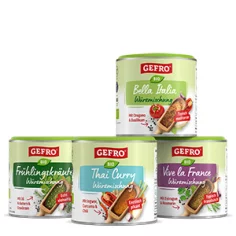Organic
We expanded our healthy range to include ten organic products. Discover a new GEFRO world, including organic soups, organic sauces and organic seasonings.
All ingredients are from controlled organic farming and full of flavour. All GEFRO organic products are controlled and ceritifed.
Filter:
Product characteristic
Ingredients
Your selection: products Reset filter
All organic
We have expanded the healthy GEFRO product range with ten beneficial ORGANIC products. Discover the flavourful world of GEFRO featuring organically grown ingredients and no flavour-enhancing additives, as in accordance with the law, but in the same trusted high quality and without the use of any conventional aids. Since the ingredients of all GEFRO ORGANIC products are in accordance with the strict European guidelines governing organic quality, they naturally bear the European ORGANIC seal.
What’s the difference between organic and conventional products?
Many of you will surely be amazed: in addition to GEFRO’s regular product range, there’s also a range of products available in ORGANIC quality. The GEFRO ORGANIC product range is very similar to our existing offer: clear broths, sauces and spices as usual, without any hydrogenated fats, no preservatives, vegan or vegetarian.
You’re probably wondering whether the organic products are better or healthier than the existing products you know or whether they are simply different products. The answer is: it’s a new array of different products. The tried-and-tested product line from GEFRO is made using food from conventional farming, whereas the products from this range all boast the label for organic food.
Dear readers, in the following I would like to explain the difference between ‘conventional’ and ‘organic’ farming so that you may make a decision for yourself which product range to select, or perhaps even select both of them.
Conventional farming
Conventional farming as we know it today dates back to the mid-19th century. At the beginning of 20th century, the field plough was pulled by horse or cow, the seeds were sown using a seed sack, weeds were pulled by hand and crops were reaped using the scythe. Many hard-working helpers were needed to secure food supplies. At the same time, more and more knowledge about plant nutrition and soil conditions was acquired, and from this time on the land was fertilised and made more fruitful. After the Second World War, mechanisation used in agriculture increased at a rapid pace. Technical inventions and increasingly sophisticated machines made work easier and made it possible to farm large areas of land productively. Fungicides and pesticides were used to control pests which in former times had completely wiped out entire harvests in just a short time. Agriculture was first made highly efficient through advances made in technology and science. The consumer benefited significantly from these developments. Today food is abundantly available at rather affordable prices.
The goal of conventional farming is to produce food efficiently. To reach an ever higher level of efficiency, however, the natural closed-loop material cycle is disrupted and altered at various points.
In the natural closed-loop system, animals fertilise the soil, the soil gives the plants the nutrients they require and the plants feed the animals. In the open system of conventional cultivation, fertilizers and synthetic pesticides may be used. Animal feed does not have to be generated on its own, instead concentrated feed is used. Slurry is produced by breeding and keeping livestock in large operations and then used to fertilise land. This does not mean that products from conventional farming are worse than products from organic farming.
How good a product ultimately is does not depend on whether it is a conventional or ORGANIC product, but on what the producer can do and what he does. In conventional farming, there are also some producers and growers (such as GEFRO) who do not partake in mass farming and offer excellent products – even without the organic seal of approval.
Organic farming
In organic farming, the focus is placed on activities surrounding the closed-loop material cycle. In addition to growing grains, vegetables, etc., organic farmers also grow food for their animals and use their manure as a fertiliser. They always abstain from using synthetic pesticides and genetic modification. Thanks to environmentally friendly production processes and the humane treatment of livestock, the burden placed on the environment by organic farming is certainly less than conventional agriculture. Organic farming meets our demands for greater protection of the environment and animals.
The question, however, is whether the higher process quality also produces an equally high-quality product? The Stiftung Warentest* consumer survey came to the conclusion that ORGANIC products hardly differ in quality when compared to conventional food (‘test’ magazine 10/2007). The quality of organic products fluctuates more than with competitor products. Problems occur with the production of organic meat, fish and dairy products, which contain more germs and spoil faster than conventional foods with preservatives. However, ORGANIC products should be far superior to conventional products when in an unprocessed state: they are almost always pesticide-free and organically grown fruits and vegetables generally do not contain any chemicals. According to Stiftung Warentest, this is a clear health benefit that conventional products cannot always offer.
Both agricultural methods can be critically examined and both have pros and cons. The key issue of ORGANIC products is protecting our biosphere through biological farming. For organic farming however, higher labour power is required and the profits generated, according to the size of land, are much lower. On the other side, what is organic about having to import organic potatoes, organic apples or organic carrots from Egypt, Australia, Argentina or Israel at all times of year? There is evidence that many conventionally managed farms now seek to maintain a balance between market-oriented production, high-quality products and the preservation of species-rich flora and fauna. Consumer criticism has greatly contributed to this development.
Quality always has the highest priority at GEFRO. All ingredients are carefully selected and are of premium quality. Try it for yourself – we look forward to hearing what you think.
Author: Dr. rer. nat. Rita Hein
Nutritionist and naturopath
* "Stiftung Warentest" is a German foundation that provides consumers impartial and objective information based on the results of comparative investigations of goods and services























